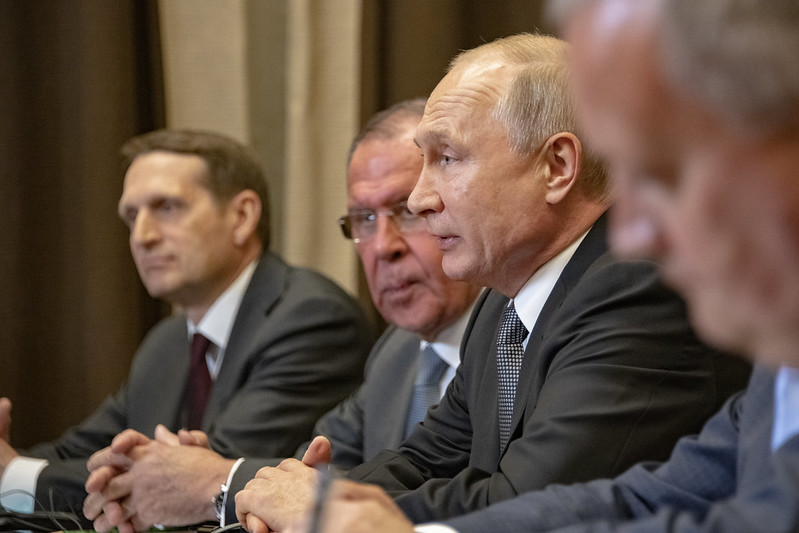
U.S. Secretary of State Michael R. Pompeo meets with Russian President Vladimir Putin in Sochi, Russia on May 14, 2019. [State Department photo by Ron Przysucha/ Public Domain]
With Russia’s brutal war against Ukraine showing no signs of reaching a conclusion, a recent study by the country’s main state-run pollster, VTsIOM, revealed that 91 percent of Russians consider themselves patriots. On the face of it, these numbers seem to vindicate two camps with a strikingly similar worldview. On the one hand, there is Vladimir Putin’s Kremlin, desperate to prove that he is fighting this war in the name of all Russians; and on the other, a growing handful of those in the West who claim to be supporters of Ukraine and Putin’s foes, but who insist with equal vehemence on the populist fallacy that it is not just Putin’s war, but that of all Russians.
A closer look at this same poll, however, reveals a striking irregularity: while 91 percent across the country call themselves patriots, that number goes up to 95 percent in Moscow and St. Petersburg, the places traditionally associated with the most anti-war sentiment. In other words, while polls like this in Russia may be intended to show vast support for the Kremlin, what they actually demonstrate is a basic notion that is entirely alien to Vladimir Putin: that for a great deal of Russians, love of their country and of their government are two different things.
How Russians define patriotism is also telling: for 48 percent, it means working towards the good of the country and making it flourish — this is the definition chosen by more educated and affluent constituents, according to the poll, while those in rural areas and with less agency are more prone to think that patriotism means your country is better than others. Some 43 percent of internet users, meanwhile, believe that patriotism means telling the truth about your country — an activity that has been criminalized by the Kremlin and equated with treason.
Loving Russia has become exceedingly difficult since its government chose to launch an invasion of Ukraine in February 2022. On the one hand, for those at home, standing up for what they believe is in the interests of their nation can now land them in jail for life, as parliament ruled this week to make treason punishable by a life sentence. On the other, many in the West find it hard to understand how Russians can continue loving their country while abhorring the war. As a result, they often label those who do not actively and vocally protest against the Kremlin — even if this might endanger friends and family back home — as Putin’s accomplices. Shunned by the Kremlin for refusing to love their government, they are equally shunned by many in the West simply for existing and trying to get on with their lives. Indeed, how can one love a people, a society, when its most powerful component, the government and its supporters, is perpetrating a senseless war?
Read more here.
If you’re willing to fight for Main Street America, click here to sign up for the Richardcyoung.com free weekly email.





